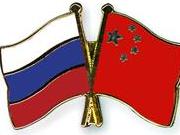Russia-Sino trade to increase as Russia's WTO entry

 0 Comment(s)
0 Comment(s) Print
Print E-mail CNTV, August 23, 2012
E-mail CNTV, August 23, 2012
On Wednesday, Russia became a full member of the World Trade Organization after 18 and half years of negotiation. But how will its entry into the WTO affect its trade relations with its biggest trading partner, China.
This is Beijing Valve General Factory, which produces high & middle pressure valves and steam trap valves. Its products are exported worldwide including Russia, Iran and Vietnam. But it is Russia that the company wants to increase its exports too, because of its abundant energy reserves. So far, it's been a tough sell.
Chen Jinpu, CEO, Beijing Valve General Factory, said, “Our products are not sold directly to Russia, but through trading corporations. But this will change after Russia's entry into the WTO. We have been waiting for this day for a long time.”
High tariffs have been another stumbling block. The factory lost its competitiveness in the Russian market due to its high price.
Russia's entry to the WTO is good news for companies like the Beijing Valve General Factory. The lowered customs tariffs are the most obvious benefit. And with this in mind, all eyes are on the future in the search for more opportunities in economic and trade cooperation under the same WTO rules.
China is Russia's largest trade partner, having overtaken Germany in 2010. In 2011, bilateral trade reached a record high of 80 billion dollars.
After the WTO accession, Russia will have to gradually lower its average tariff ceiling to 7.8 percent from its current 10 percent, with agricultural tariffs going down from 13.2 percent to 10.8 percent. Tariffs on industrial products will slip from 9.5 percent to 7.3 percent.
Chen Junhua, Assistant Professor, Central University of Finance and Economics, said, “Yes. Lower tariffs are good news for Chinese companies. But we should also remember that it applies to the world market. Companies across the globe now have the same opportunities to take a piece of the pie. So we should add value to our products. ”
Russia and China, now trading under the same rules, will enjoy numerous opportunities to expand investment and cooperation. This will yield win-win results for both countries.





